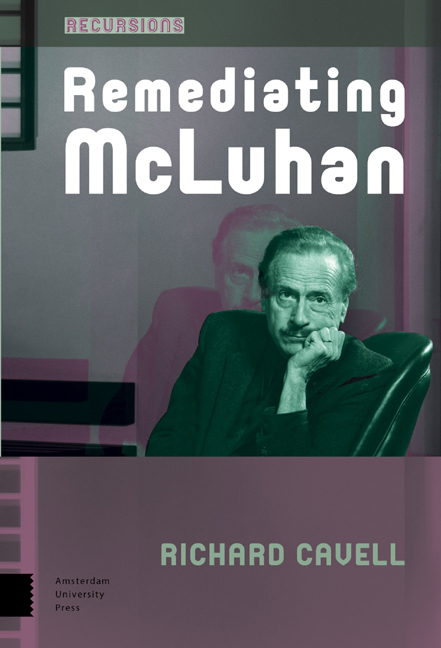Book contents
- Frontmatter
- Dedication
- Contents
- Introduction
- List of sigla
- I
- Re: Mediation
- 1 Beyond McLuhanism
- 2 McLuhan and the Question of the Book
- Embodiment as Incorporation
- 3 McLuhan and the Body as Medium
- 4 McLuhan, Tactility, and the Digital
- 5 Mechanical Brides and Vampire Squids
- Empathic Media
- 6 McLuhan: Motion: e-Motion: Towards a Soft Ontology of Media
- 7 Re-Mediating the Medium
- Determining Technology
- 8 McLuhan, Turing, and the Question of Determinism
- 9 Angels and Robots
- Being Mediated
- 10 Marshall McLuhan’s Echo-Criticism
- 11 McLuhan and the Technology of Being
- II
- 12 The Tragedy of Media: Nietzsche, McLuhan, Kittler
- Coda: On the 50th Anniversary of Understanding Media
- Notes
- Works Cited
- Index
9 - Angels and Robots
Published online by Cambridge University Press: 12 December 2020
- Frontmatter
- Dedication
- Contents
- Introduction
- List of sigla
- I
- Re: Mediation
- 1 Beyond McLuhanism
- 2 McLuhan and the Question of the Book
- Embodiment as Incorporation
- 3 McLuhan and the Body as Medium
- 4 McLuhan, Tactility, and the Digital
- 5 Mechanical Brides and Vampire Squids
- Empathic Media
- 6 McLuhan: Motion: e-Motion: Towards a Soft Ontology of Media
- 7 Re-Mediating the Medium
- Determining Technology
- 8 McLuhan, Turing, and the Question of Determinism
- 9 Angels and Robots
- Being Mediated
- 10 Marshall McLuhan’s Echo-Criticism
- 11 McLuhan and the Technology of Being
- II
- 12 The Tragedy of Media: Nietzsche, McLuhan, Kittler
- Coda: On the 50th Anniversary of Understanding Media
- Notes
- Works Cited
- Index
Summary
In the mid-1970s, Marshall McLuhan proposed to revisit his foundational text, Understanding Media, in order to address the generation that had experienced the transition from visual space to acoustic space—from the space produced by print media to the space produced by electronic media. Whereas visual space was abstracting, monological and eye-bound, argued McLuhan, acoustic space was involving, dialogical and multi-sensual. What, asked McLuhan, were the implications of this massive shift? The question is no less pertinent now that the move into the electronic regime has advanced so considerably, with the spatial element having become crucial to an understanding of ubiquitous communications.
Philip Marchand writes in his biography that ‘McLuhan's never-ending search for collaborators found him working in 1979 with Bruce Powers, a professor of communications for Niagara University. […] Powers was knowledgeable about new information technologies such as fiber optics and microwave transmissions; […] together the two planned to write a book called The Social Impact of New Technologies’ (Marshall McLuhan, p. 266). That book was not completed because McLuhan suffered a severe stroke in late September, 1979, which left him unable to speak, read or write (Marchand, p. 270), but in 1989, Powers published The Global Village: Transformations in World Life and Media in the 21st Century, a compilation of McLuhan's writing, and of dialogues between McLuhan and Powers. In the book that McLuhan had been planning, he had not been proposing to revise substantively the media theory he had put forward in Understanding Media. He was, in fact, refining these theories as the tetradic Laws of Media, which were published posthumously in 1988. Rather, writes Powers, ‘McLuhan, in his final years, wanted to talk to a new generation, one which was twenty to twenty-five years beyond Understanding Media (1964) […] [and] […] in the grasp of a vast material and psychic shift between the values of linear thinking, of visual, proportional space, and that of the values of the multi-sensory life, the experience of acoustic space’ (GV, p. ix). Powers states that McLuhan sought to develop the implications of the notion that ‘the extensions of human consciousness were projecting themselves into [a] total world environment via electronics’ (p. vii).
- Type
- Chapter
- Information
- Remediating McLuhan , pp. 97 - 106Publisher: Amsterdam University PressPrint publication year: 2016



